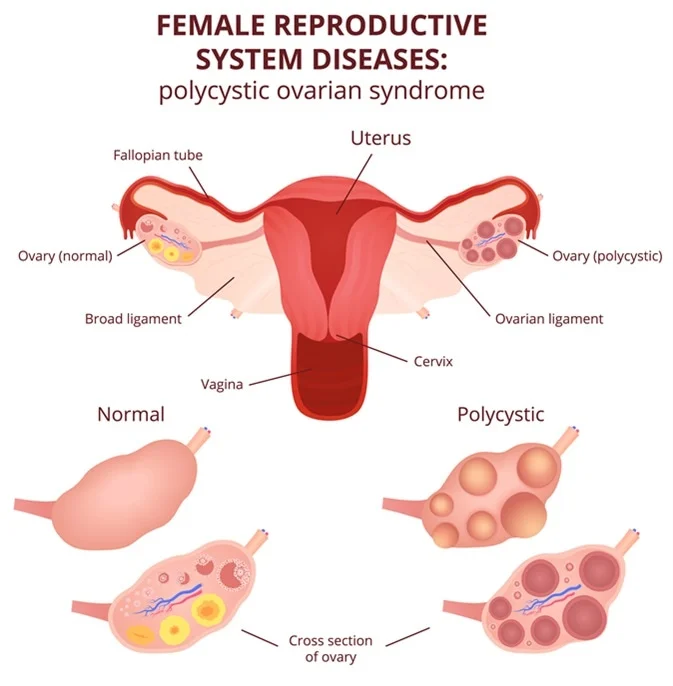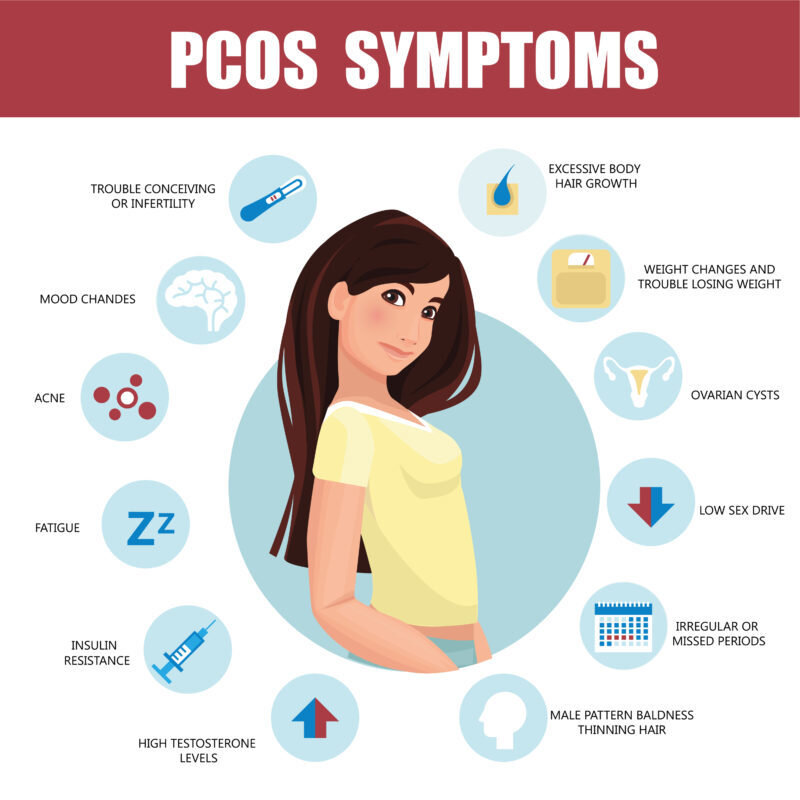Polycystic Ovarian Syndrome
PCOS is the most common endocrine disorder in women
It is defined according to the Rotterdam criteria ,when 2 or more of the following signs are present
- Irregular menses or delayed menses due to delayed/no egg release(oligo/anovulation)
- Clinical or biochemical evidence of increased androgen(male hormones) levels in body
- Polycystic morphology of ovaries on ultrasound.
PCOS is a multi faceted syndrome with Gynecologic, Endocrine, Metabolic sequelae.
Why does PCOS occur?
- Insulin Resistance development in body
- High level of LH released from brain
- Increased androgen levels leading to difficulty in egg production in ovaries which lead to anovulation .

Symptoms of PCOS
Typical symptoms include:
- Irregular menstrual cycle
- Weight gain
- Difficulty reducing the weight
- Hirsutism
- Infertility
- Mood Disorders
- Acne and hair fall

How can we prevent PCOS?
- No interventions have been demonstrated to prevent the development of the disease. But we can keep it under control.
- Lifestyle modification is the key feature by which we can keep the disease under control.
- Exercise , yoga, and a healthy Diet helps patient keep symptoms free.
What to Eat?
The basic guidelines for a PCOS diet are to focus on whole grains, fresh produce, and plant-based proteins while limiting sugar, processed food, and trans fat.
Depending on your overall health needs, you may need to adjust your intake of specific macronutrients (fat, protein, carbohydrates) or add supplements.
Food you can take
- High-fiber fruits and vegetables (apples, plums, broccoli, cauliflower)
- Leafy greens
- Root veggies
- Red berries and grapes
- Beans, legumes, lentils
- Whole-grain or multigrain bread, crackers, pasta
- Brown rice, quinoa
- Oats, rye, barley
- Flax, chia, and sunflower seeds
- Corn or wheat tortillas
- Cottage cheese/Paneer
- Eggs, egg whites, egg substitutes
- Low-fat and Greek yogurt
- Non-dairy milk alternatives (almond, rice)
- Avocado
- Hummus
- Coconut and coconut oil
- Nuts and nut butters
- Olive oil, flaxseed oil
- Fresh herbs and spices (turmeric, cinnamon, ginger)
- Dark chocolate (in moderation)
- Green tea

Tips for Women with PCOS and obesity
- Monitor your portion sizes
- Eat whole grain and high-fiber foods
- Limit added sugars
- Balance your plate
- Limit added salt
- Choose heart-healthy fats
Long term sequelae of PCOS
- Diabetes mallitus
- Cardiovascular disease
- Obesity
- Mood disorders
Treatment??
- oral contraceptive pills are the best option → Depends on what is the requirement of the patient. If the patient is young , unmarried and requires regularization of the menstrual cycle
- In cases of infertility → ovulation induction medicines like, Letrozole, Clomiphene Citrate, Gonadotropins depending on requirement
- In long heavy irregular periods → Mirena intrauterine device